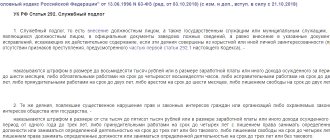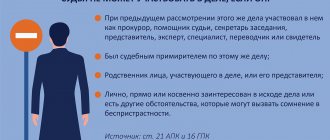Effect of Art.
297 of the Criminal Code of the Russian Federation is designed to protect Russian justice. Often after a trial, the people involved are dissatisfied with the verdict rendered by the judge. Some of them, out of anger, may insult or perform any other disrespectful actions towards the judge, trying to belittle his dignity. But unfortunately for them, such behavior carries with it the punishment specified in Art. 297 CC. Multi-channel free hotline Legal advice on criminal law. Every day from 9.00 to 21.00
Moscow and region: +7 (495) 662-44-36
St. Petersburg: +7 (812) 449-43-40
Another commentary on Article 297 of the Criminal Code of the Russian Federation
1. The direct object of the crime is the procedure for judicial proceedings established by regulatory enactments.
An additional object of the crime is the honor, dignity and business reputation of the participants in the trial. The victims are the persons specified in the law (participants in the trial (part 1), as well as a judge, juror, other person involved in the administration of justice (arbitration assessor, prosecutor - part 2)). Participants in the trial (Part 1 of Article 297 of the Criminal Code) include all persons participating in the trial, with the exception of the persons named in Part 2 of the article in question. These participants in the trial can be: prosecutor, bailiff, witness, expert, witness, specialist, translator, defense attorney, victim, defendant, court secretary, civil plaintiff, civil defendant, interested parties, etc. Participants in civil proceedings are persons participating in the case (Article 34 of the Code of Civil Procedure). Participants in arbitration proceedings include persons participating in the case (Article 40 of the Arbitration Procedure Code), as well as their representatives and persons contributing to the administration of justice - an expert, witness, translator, assistant judge and secretary of the court session (Article 54 of the Arbitration Procedure Code). 2. The objective side of the crime (parts 1 and 2) consists of actions expressing contempt of court by insulting a participant in the trial, a judge, a juror or arbitrator, or a prosecutor. Insult is a negative assessment of the personal qualities of any participant in the trial, expressed in an obscene, indecent form, expressed during a court hearing or on the premises of the court, aimed at humiliating his honor, dignity and business reputation. Insult can be expressed, for example, in a humiliating statement about the unprofessionalism of the defense attorney, the bias of the judge, the rudeness of the prosecutor, obscene language addressed to the participants in the court hearing, or in a cynical statement in the presence of the victims, aimed at the characteristics of their personality, etc.
3. Actions are carried out through oral or written statements, conclusive actions in the courtroom and are considered completed from the moment they are committed, regardless of the consequences. The corpus delicti by design is formal.
4. Insulting the listed persons outside the courtroom or after the resolution of the case, although in connection with the consideration of this case, materials in court, does not constitute a crime. Therefore, a mandatory feature of the objective side of this crime is the place where the crime was committed - the courtroom or other court premises.
5. The subject of the crime is a sane individual who has reached the age of 16.
6. The subjective side of the crime is characterized by guilt in the form of direct intent.
Difficulty of proof
It so happens that these crimes and violations are extremely difficult to prove. Therefore, judges rarely initiate cases under such articles. It takes a lot of time and effort to collect evidence.
The same responsibility falls on the shoulders of bailiffs. However, due to the low level of culture, they are simply lost and do not know what to do in such situations.
Expert opinion
Bikmaeva Elmira Fanovna
Arbitration manager with more than 10 years of experience
Another difficulty is the involvement of linguist specialists in the case, who could verify and establish the fact of insult. This is due to the fact that there are no such experts on the court staff. And if they do exist, they have insufficient knowledge.
You can prove insult using the minutes of the court hearing. But according to regulations, recording profanity is prohibited. It is allowed to replace some words with synonyms or replace some letters in words with ellipses.
Employee behavior
It is advisable to familiarize yourself with the rules of conduct at the meeting in advance. For this purpose, there is a Code of Ethics, which sets out the rules of employee conduct. Do employees have any advantages? They do not have any privileges, so they should behave calmly, kindly, politely
It is important to be tolerant of all participants in the court hearing.
The employee does not have the right to speak. Actions that discriminate against people based on gender, age, race, nationality, citizenship, or material wealth are not permitted. It is also prohibited to humiliate a person, his desires and interests. Therefore, any phrases must be expressed in a cultural and restrained form.
Rudeness, arrogance, and bias are prohibited. Employees do not have the right to threaten, insult, or humiliate colleagues or participants. Illegal behavior, such as fighting, is unacceptable.
Insulting a judge that has no connection with the administration of justice
If court employees or participants in the process are subjected to insults that have no motivating connection with the administration of justice (i.e., they are committed outside of court and are not related to professional activities), then such acts cannot be classified as a criminal offense, but entail administrative responsibility. They fall under Article 5.61 of the Code of Administrative Offenses of Russia.
https://youtube.com/watch?v=BGcozwglKGY%3Ffeature%3Doembed
Dear readers, each case is individual. If you want to find out how to solve your particular problem, call:
- Moscow.
- Saint Petersburg.
Examples from practice and sentences under Art. 297 of the Criminal Code of the Russian Federation
In November 2015, V.V. Savchenko, a native of Ukraine, while leaving the room in which the trial took place, in the presence of the participating courts, showing her disrespect for the court, publicly, deliberately expressed obscene language at Judge Izmailov. Now she faces being taken into custody for up to six months or paying a fine.
In 2016, in the Komi Republic, a man accused of a sexual offense spat on the victim and made obscene remarks towards the judge.
In September 2014, in the Kostroma region, a man was fined for posting on his social network a post about the decision of a court case for petty hooliganism, and adding an offensive expression of his own, directed towards the judge, containing obscene words.
All these people showed disrespectful behavior, as a result of which they were punished accordingly.
Interesting facts regarding this article:
- According to the Judicial Department of the Russian Federation, this article is used infrequently. Less than three hundred people are judged on it per year.
- According to a survey conducted in 2011, about 97% of judges noted that they had encountered disrespectful actions towards themselves.
- One of the very first and most terrible punishments for this crime occurred in England, Salisbury. In 1631, a man named Brickbat expressed his opinion that Chief Justice Richardson was conducting the trial very strictly. Immediately after these words, an accusation was drawn up against him, after which he was hanged, and before that his hand was cut off; all this happened during the trial.
Thanks to the legislator, the process of administration of justice is protected from unlawful actions of unscrupulous citizens.
The jury discharges
The actions of Moscow notary Fail Sadretdinov were also classified under several articles of the Criminal Code: in 2007, he was accused of contempt of court (Article 297), using violence against a government official (Article 318) and intentionally damaging documents (Article 325). Sadretdinov at that time had already been convicted in one case of apartment fraud and was a defendant in another case under the same article; in addition, he was accused of organizing the murder of journalist Paul Klebnikov. As stated in the case materials, while familiarizing himself with documents in the pre-trial detention center, Sadretdinov went to the toilet, returned from there with a package emitting an unpleasant odor and hit the investigator in the face with it, at the same time staining two volumes of the criminal case. (The accused himself insisted that he did not beat the investigator, but only “wiped himself” with the case materials, as the investigator suggested to him in response to numerous complaints and petitions).
Two days later, a rebellious notary, whose arrest was extended in the Zamoskvoretsky court, swore at the prosecutor and the judge there, and also waved a metal leg broken off from the bench in the cage and with it pinched the bailiff’s “fourth finger of his left hand, causing a bruise.” All these actions became the reason for initiating a criminal case.
In 2008, Sadretdinov appeared in court, and at his request, the case of contempt of court was considered by a jury - such an opportunity is provided for those accused under this article of the Code of Criminal Procedure. Testimony was given by an insulted judge, an investigator smeared with feces, and a bailiff with an injured finger. As a result, 10 out of 12 jurors voted for the notary's innocence on all counts.
“The disrespect for the court was expressed in the fact that, according to the prosecution, he shouted insults at the judge, in particular, calling her a “horse face” and various obscene words. But the prosecution did not detail how exactly he insulted her, and there was no recording either. Sadretdinov denied that he swore so rudely, convincing the jury that after four years in prison, for him, all women are beauties, and he would not have dared to say such a thing. The defense explained to the jury why Sadretdinov flared up: it listed all the violations of the law committed against him, his complaints and petitions that were left unsatisfied. And it seemed to me that the jury accepted the history of the violation of his rights and therefore took his side,” lawyer Anna Stavitskaya, who represented the interests of the controversial notary in court, told Mediazona.
The case of Sadretdinov is one of the few where an acquittal was issued under Article 297 of the Criminal Code. In 2009, three people were acquitted under this article, in 2010 - one, in 2011 - five, in 2012 - three, in 2013 - one person.
“If the practice of considering such cases by juries were wider, it could be very interesting, because the court would consider not only the fact of insult, but also what brought the person to the state in which he began to behave this way,” notes Stavitskaya.
But after the adoption of amendments to the Code of Criminal Procedure, which came into force in January 2013, cases of contempt of court were removed from the jurisdiction of the jury. In 2014 and 2015, the courts did not issue acquittals under Article 297.
What is considered an insult
Insulting a judge or other person involved in the consideration of a case is recognized as verbal and non-verbal actions expressed in an indecent (inappropriate to the current standards of morality and ethics) form. These may include:
- Insults expressed orally, including but not exclusively using obscene language.
- In written form (notes, letters, other documents).
- In the form of offensive drawings. For example, derogatory cartoons.
- In actions that humiliate honor and dignity. For example, gestures, indecent body movements, etc.
- Actions that involve physical violence*. For example, tearing off clothes, slapping, etc.
*Please note that this paragraph does not apply to assaulting a judge or other person involved in the hearing of a case. Battery, grievous bodily harm, assault with use, etc.
items are qualified under Article 296 of the Criminal Code of Russia on violent actions against persons administering justice.
From the point of view of the law, the truthfulness or falsity of the information (assessment of actions) of the judge does not matter. Only the indecent form of insult is important.
If honor and dignity are harmed, authority and/or prestige is undermined, or the respect of judicial officers is damaged, then such a crime falls under Article 297 of the Criminal Code of Russia.
Regulatory acts
Depending on the severity of the offense, the guilty person may be sentenced to administrative or criminal liability. Consider the list of articles of the Criminal Code of the Russian Federation for individuals:
- 297;
- 315;
- 318;
- 319.
List of articles of the Code “On Administrative Offences”:
- 17.3;
- 17.4;
- 17.5.
However, there are other legislative acts on the basis of which a person can be held accountable. These include:
- 122 CAS RF;
- 159 Code of Civil Procedure of the Russian Federation;
- 119 of the Arbitration Procedure Code of the Russian Federation.
Consultations in court
What behavior should a person have if there are questions? But you can’t ask them to the judge. It has visiting hours and therefore you should make an appointment in advance for a consultation. In this case, you can get answers to all questions.
It should be borne in mind that judges do not help prepare documentation. This work is done by lawyers. In all court buildings there are samples of the execution of various applications, details for transferring state fees and other necessary information for citizens.
It is important to follow all the rules, otherwise breaking them may result in a fine. Moreover, the court is an executive branch, and therefore, when addressed impolitely, a citizen shows his attitude towards the country
By my rules
Another reason why a judge may consider that he is being treated with disrespect may be failure to comply with the rules for conducting a dispute that the arbitrator has established. “I had a case when a servant of Themis felt that I was disrespectful to her. She obliged me to prove my claims, although I represented the interests of the defendant. According to the rules, the plaintiff must prove his claims. In response to this request, I, citing legal norms, tried to convince her that this was not my responsibility. That’s where I heard that there was no need to teach a judge how to live; the case was lost,” says Alexander Trach.
During meetings, such situations happen quite often. Judges (only on the basis that they determine how the meeting should take place) dictate conditions that often contradict either generally accepted norms or legally established rules. It is not always possible to assess how much the order introduced by the arbitrator contributes to establishing the truth. However, objections to the servants of Themis lead in most cases to sad consequences and lost cases. Therefore, even if you see in the “rules of the game” that the judge established a deviation from procedural norms, it is better not to contradict the arbitrator; most often, your arguments will still not be able to influence the result.
Behavior rules
If a hearing is scheduled, you need to know not only how to address the judge, but also the rules of conduct in court. They will make you feel comfortable and also prevent common mistakes. The rules of conduct are prescribed in Art. 158 of the Civil Procedure Code:
- when the judge enters, everyone must stand;
- All testimony, statements, appeals are given standing;
- You can start speaking with the permission of the judge;
- the rules are the same for everyone, regardless of position and other factors;
- the violator is given a warning; repeated actions may result in removal from the hall or imposition of a fine;
- upon entry, security is presented with a passport and a summons, and the purpose of the visit should also be reported;
- upon arrival you will need to register with the secretary.
Acceptable types of requests
In practice, there are other types of appeals. They are not prohibited because they are specific and concise. How to address a judge in court in other ways? The phrases “Mr. Judge”, “Comrade Judge”, “High Court” are suitable. You need to make a speech using the “you” form.
You should not interrupt the judge when he is saying something. You can speak out after he finishes doing this. You should speak clearly and distinctly. There is no need to raise your voice or use indecent language. It is not permissible to insult any of the participants in the hearing. A person is responsible for this. It is necessary to take into account that the form of appeal affects further relations between all participants in the case.
Mistrust as punishment for callousness
In practice, there are any number of cases when the basis for suspecting an arbitrator of incompetence and unwillingness to establish justice is the indifference of this person vested with authority to his case.
“I once had to insist on recusal. I was sued on an openly fabricated case. Even the documents that the prosecutor presented raised doubts. Realizing that the judge was not paying any attention to this, I tried to change him. This resulted in the same person paying more attention to the case, understanding all the details and making the right decision. I understand that judges have a heavy workload, but innocent people should not suffer from this,” says entrepreneur Andrei Sypko.
“We can cite an interesting case from judicial practice that took place in the UK. There, the lawyer challenged the judge only because he behaved indifferently and distantly when the lawyer himself spoke, and when the opposing side spoke, he leaned his body forward, thereby expressing his interest. The representative considered that this behavior of the judge influenced the jurors,” says Sergei Zherdev.
The difficulty in using the mechanism to challenge a judge is that the application is reviewed by the same person to whom you express no confidence . However, there are very few judges who go into open conflict and insist on considering the case themselves, even knowing about the negative attitude of the participants in the process.
What documents should I take?
At the entrance to the court there are usually guards or a bailiff who check documents. If this is an employee, then he has an official ID. Otherwise, a passport is provided.
If the call was made on the basis of a summons, then it must be provided. It indicates the room number where the meeting will take place, where you need to go to register. This is done before the process begins.
The attendance of all participants is required. Anyone can attend such an event, even if there was no invitation. Law students as well as interested citizens may attend the meeting.
Filming of the event is prohibited. But you can make an audio recording. Russian legislation prohibits photography and video recording. It is allowed to be carried out with the consent of the court. But it is allowed to record everything with a voice recorder and audio devices.
“They were waiting for you, but why didn’t you come?”
By and large, the failure of one of the parties to a case to appear in court is generally a common occurrence. This is understandable, because as a general rule, if the plaintiff and (or) defendant, who were timely and correctly notified of the place and time of the arbitration hearing, fail to appear at the arbitration hearing, the court has the right to consider the case in their absence (Part 3 of Article 156 of the Arbitration Procedure Code of the Russian Federation). It turns out that participants in arbitration disputes are independent in choosing the forms of their participation in the process . Therefore, forcing the parties to compulsorily attend the courtroom may well be regarded as the arbitrators exceeding their powers and interfering in the outcome of the case, which should depend solely on the will of the parties, and the collection of fines for failure to appear may be declared unlawful.
Nevertheless, it is precisely the absence of one of the parties (or other participants in the process) at the hearing that is associated with almost half of the charges of contempt of court. For example, quite often judges are offended by the fact that the parties to the case do not come to the preliminary hearings, and punish the disputants with a fine for this (Decision of the Moscow Arbitration Court of May 26, 2003 in case No. A40-11117/03-2-69 ). However, this basis can also be contested. After all, according to the meaning of ch. 11 of the Arbitration Procedure Code of the Russian Federation, contempt of court as a procedural offense can only be expressed in the commission of actions or inaction at a court hearing in the presence of the court and other participants in procedural legal relations. Therefore, the failure of a representative to appear at a court hearing in itself does not constitute contempt of court (Resolution of the Thirteenth Arbitration Court of Appeal of October 4, 2010 in case No. A56-20097/2010). By the way, the argument that the author of the letter published at the beginning of the article told us about is also quite viable. It was with his help that one of the participants in the dispute heard in the Moscow District Arbitration managed to melt the hearts of the cassation judges (Resolution of the Federal Antimonopoly Service of the Moscow District dated August 18, 2003 N KA-A40/4891-03).
Sometimes arbitration judges announce the mandatory presence at the hearing, including the preliminary one, of all participants in the process. And if one of them violates this “mandatory” regime, he is immediately accused of contempt of court (see, for example, Resolution of the Federal Antimonopoly Service of the Ural District dated December 2, 2002 N F09-2519/02-AK). In this case, we must remember that attendance can be recognized as mandatory only for representatives of government agencies and officials (Part 3 of Article 200 of the Arbitration Procedure Code of the Russian Federation), but not for commercial enterprises.
One of the easiest ways to remove the suspicion that by not attending the hearing you did not want to offend the court and judges is to prove that you were not notified where and when the case would be heard. To do this, you need to indicate that for an unknown reason you did not receive a determination of the time and place of consideration of the dispute and the case materials do not contain any documents that could refute your testimony (Resolution of the Federal Antimonopoly Service of the Volga District dated October 14, 2003 N A12-17186/02 -C45-V/38).
“I’ll tell you an interesting case from my own practice,” Nikolai Chegurov, general director of the consulting company, shares his experience. — Represented the interests of an enterprise in a dispute with the tax inspectorate regarding tax refunds. At the beginning of the next meeting, I submit my passport to the judge, and he demands a court decision, where I was appointed in bankruptcy. He explained that this document was attached to the claim. To which the arbitrator said that there was a copy, but he needed the original. And he postpones the meeting due to my failure to appear, warning that if this happens again next time, he will be fined for contempt of court, expressed in failure to appear and repeated failure to submit documents necessary for the meeting. On the one hand, the situation looks strange. On the other hand, formally speaking, the judge is probably right. After all, it turns out that my powers were not confirmed by a properly certified judicial act, which means that the plaintiff had no one who could legally represent his interests.”
In fact, the judge has the legal right to require a participant to be present at the meeting and to punish for failure to appear if this person represents the state side in the dispute . It does not include the criterion of voluntariness of attending all stages of the dispute consideration. “In my practice, there was a case when I represented the interests of the tax authorities and was 10 minutes late to court; During this time, the arbitrator managed to call my boss, inform me that I was not there, threaten me with a fine and declare that I thereby showed contempt of the court,” says lawyer, financial law specialist at the consulting firm Alexey Zaitsev.






